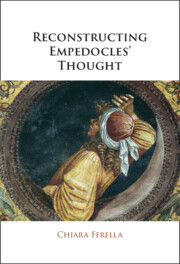Book contents
- Reconstructing Empedocles’ Thought
- Reconstructing Empedocles’ Thought
- Copyright page
- Dedication
- Contents
- Acknowledgements
- Introduction
- Chapter 1 Reconstructing Empedocles’ On Nature
- Chapter 2 The Proem to On Nature
- Chapter 3 Daimones between Plato and Pythagoras
- Chapter 4 Divine Beings
- Chapter 5 Changes of Form, Personal Survival and Rebirth
- Chapter 6 Knowing Nature as a God
- Chapter 7 Cosmic Cycle, Moral Import and Rebirth
- Chapter 8 Epilogue
- Bibliography
- Index
Chapter 3 - Daimones between Plato and Pythagoras
Published online by Cambridge University Press: 01 February 2024
- Reconstructing Empedocles’ Thought
- Reconstructing Empedocles’ Thought
- Copyright page
- Dedication
- Contents
- Acknowledgements
- Introduction
- Chapter 1 Reconstructing Empedocles’ On Nature
- Chapter 2 The Proem to On Nature
- Chapter 3 Daimones between Plato and Pythagoras
- Chapter 4 Divine Beings
- Chapter 5 Changes of Form, Personal Survival and Rebirth
- Chapter 6 Knowing Nature as a God
- Chapter 7 Cosmic Cycle, Moral Import and Rebirth
- Chapter 8 Epilogue
- Bibliography
- Index
Summary
Chapter 3 focuses on δαίμων and its significance in Empedocles’ concept of rebirth. I show that the demonological fragments and the term δαίμων, in particular, emphasize Empedocles’ divine nature in contrast to the rest of humankind and cannot represent, as is generally believed, the place where his personal vicissitude becomes exemplary of every soul’s destiny, thus grounding his doctrine of rebirth. To define what Empedocles intended when he called himself a reincarnated δαίμων, I analyze Plato’s myths of the soul’s otherworldly journeys and some fragments attesting to Pythagoras’ demonology. While Plato, in his concept of rebirth, conceptualized the δαίμονες as deities who guide souls during and beyond this life, Pythagoras articulated the idea that a god could exceptionally undergo rebirths, but these are usually reserved for ordinary souls. Following Pythagoras and anticipating Plato, Empedocles constructs his demonology which is linked, but does not overlap, with his doctrine of rebirth. Finally, addressing the issue of the ‘physical’ δαίμων in B 59 I argue that δαίμων is a predicative notion which, in all Empedoclean occurrences, is still intimately connected to the traditional sense of ‘god’.
- Type
- Chapter
- Information
- Reconstructing Empedocles' Thought , pp. 138 - 184Publisher: Cambridge University PressPrint publication year: 2024

